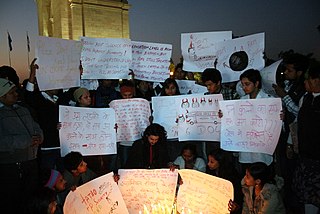
Salò, or the 120 Days of Sodom, billed on-screen as Pasolini's 120 Days of Sodom on English-language prints and commonly referred to as simply Salò, is a 1975 political art horror film directed and co-written by Pier Paolo Pasolini. The film is a loose adaptation of the 1785 novel The 120 Days of Sodom by Marquis de Sade, updating the story's setting to the World War II era. It was Pasolini's final film, released three weeks after his murder.
Sex and the law deals with the regulation by law of human sexual activity. Sex laws vary from one place or jurisdiction to another, and have varied over time. Unlawful sexual acts are called sex crimes.
In scholarly literature and criminology, gang rape, also called serial gang rape, party rape, group rape, or multiple perpetrator rape, is the rape of a single victim by two or more violators. Gang rapes are forged on shared identity, religion, ethnic group, or race. There are multiple motives for serial gang rapes, such as for sexual entitlement, asserting sexual prowess, war, punishment, and, in up to 30% of cases, for targeting racial minorities, religious minorities, or ethnic groups.

Violence against women (VAW), also known as gender-based violence and sexual and gender-based violence (SGBV), is violent acts primarily committed by men or boys against women or girls. Such violence is often considered a form of hate crime, committed against persons specifically because they are of the female gender, and can take many forms.

Vanaja is a 2006 Telugu-language drama film written and directed by Rajnesh Domalpalli on a story that constituted his Master of Fine Arts thesis at Columbia University. The film was made on a shoestring budget using a cast of non-professional first-timers for two and a half months.

Rape is a type of sexual assault involving sexual intercourse, or other forms of sexual penetration, carried out against a person without their consent. The act may be carried out by physical force, coercion, abuse of authority, or against a person who is incapable of giving valid consent, such as one who is unconscious, incapacitated, has an intellectual disability, or is below the legal age of consent. The term rape is sometimes casually inaccurately used interchangeably with the term sexual assault.

Rape during the Bosnian War was a policy of mass systemic violence targeted against women. While men from all ethnic groups committed rape, the vast majority of rapes were perpetrated by Bosnian Serb forces of the Army of the Republika Srpska (VRS) and Serb paramilitary units, who used rape as an instrument of terror and a key tactic in their programme of ethnic cleansing. Estimates of the number of women raped during the war range between 10,000 and 50,000. Accurate numbers are difficult to establish and it is believed that the number of unreported cases is much higher than reported ones.

The Democratic Republic of the Congo, and the east of the country in particular, has been described as the "Rape Capital of the World", and the prevalence and intensity of all forms of sexual violence has been described as the worst in the world. Human Rights Watch defines sexual violence as "an act of a sexual nature by force, or by threat of force or coercion", and rape as "a form of sexual violence during which the body of a person is invaded, resulting in penetration, however slight, of any part of the body of the victim, with a sexual organ, or of the anal or genital opening of the victim with any object or other part of the body."

The rate of sexual violence in South Africa is among the highest recorded in the world. Police statistics of reported rapes as a per capita figure has been dropping in recent years, although the reasons for the drop has not been analysed and it is not known how many rapes go unreported. More women are attacked than men, and children have also been targeted, partly owing to a myth that having sex with a virgin will cure a man of HIV/AIDS. Rape victims are at high risk of contracting HIV/AIDS owing to the high prevalence of the disease in South Africa. "Corrective rape" is also perpetrated against LGBT men and women.

Marie-Sophie Nélisse is a Canadian actress. She is known for her Genie Award–winning performance in Monsieur Lazhar, as Liesel Meminger in the film adaptation of the best-selling novel The Book Thief, written by Markus Zusak, and as Caroline in The Kid Detective. She stars as young Shauna in Showtime's series Yellowjackets.

The Toronto Tabla Ensemble (TTE) is a non-profit charitable organization founded by Artistic Director and tabla master Ritesh Das. The performing ensemble has toured Canada coast-to-coast six times, toured Australia in 2006, and India in 2011.

Chandan Sen is an Indian Bengali-language stage, television and film actor, playwright and director.

The 2012 Delhi gang rape and murder, commonly known as the Nirbhaya case, involved a rape and fatal assault that occurred on 16 December 2012 in Munirka, a neighbourhood in South Delhi. The incident took place when Jyoti Singh, a 22-year-old physiotherapy intern, was beaten, gang-raped, and tortured in a private bus in which she was travelling with her male friend, Avnindra Pratap Pandey. There were six others in the bus, including the driver, all of whom raped the woman and beat her friend. She was rushed to Safdarjung Hospital in Delhi for treatment and, as the public outrage mounted, the government had her transferred to Mount Elizabeth Hospital, Singapore eleven days after the assault, where she succumbed to her injuries two days later. The incident generated widespread national and international coverage and was widely condemned, both in India and abroad. Subsequently, public protests against the state and central governments for failing to provide adequate security for women took place in New Delhi, where thousands of protesters clashed with security forces. Similar protests took place in major cities throughout the country. Since Indian law does not allow the press to publish a rape victim's name, the victim was widely known as Nirbhaya, meaning "fearless", and her struggle and death became a symbol of women's resistance to rape around the world.
Prosecution of gender-targeted crimes is the legal proceedings to prosecute crimes such as rape and domestic violence. The earliest documented prosecution of gender-based/targeted crimes is from 1474 when Sir Peter von Hagenbach was convicted for rapes committed by his troops. However, the trial was only successful in indicting Sir von Hagenbach with the charge of rape because the war in which the rapes occurred was "undeclared" and thus the rapes were considered illegal only because of this. Gender-targeted crimes continued to be prosecuted, but it was not until after World War II when an international criminal tribunal – the International Military Tribunal for the Far East – were officers charged for being responsible of the gender-targeted crimes and other crimes against humanity. Despite the various rape charges, the Charter of the Tokyo Tribunal did not make references to rape, and rape was considered as subordinate to other war crimes. This is also the situation for other tribunals that followed, but with the establishments of the International Criminal Tribunal for the former Yugoslavia (ICTY) and the International Criminal Tribunal for Rwanda (ICTR), there was more attention to the prosecution of gender-targeted crimes with each of the statutes explicitly referring to rape and other forms of gender-targeted violence.

Pocket Gangsters is a 2015 Indian Hindi language comedy drama film written and directed by Hemant Nilim Das, produced by V. M. Shah, and starring Madhur Mittal, Raghubir Yadav, and Mukesh Bhatt. Though initially announced to release in July 2013 and then re-slated for September 2014, the film was finally released January 2015.
Minati Mishra was an Indian classical dancer and actress, known for her expertise in the Indian classical dance form of Odissi. She was reported in 2011 to be the oldest-living Odissi performer. The Government of India honored Mishra in 2012, with the fourth-highest civilian award of Padma Shri.

Rima Das is an Indian filmmaker best known for her 2017 film Village Rockstars, which won several national and international awards and became India's official entry for the 90th Academy Awards in the Best Foreign Language Film category. Chosen out of 28 other entries in India, it was also the first Assamese film to be submitted for Oscars. The film won India's National Award for Best Film and Best Editor.

Nabab LLB is a Bangladeshi legal drama film. The film is directed and written by Anonno Mamun, and produced by Azmat Hossain under the banner of Celebrity Production. It is a courtroom drama based on rape and violence against women. The film depicts the story of raped women protesting for their rights through social protests and judicial system. The film revolves around a rape victim Shuvra who is a radio jockey by profession, with Shakib Khan, who fought a legal battle in the court as her chief lawyer, Mahiya Mahi and Shahiduzzaman Selim played in the lead roles.
Madeleine Sims-Fewer is a British-Canadian independent filmmaker and actress.














